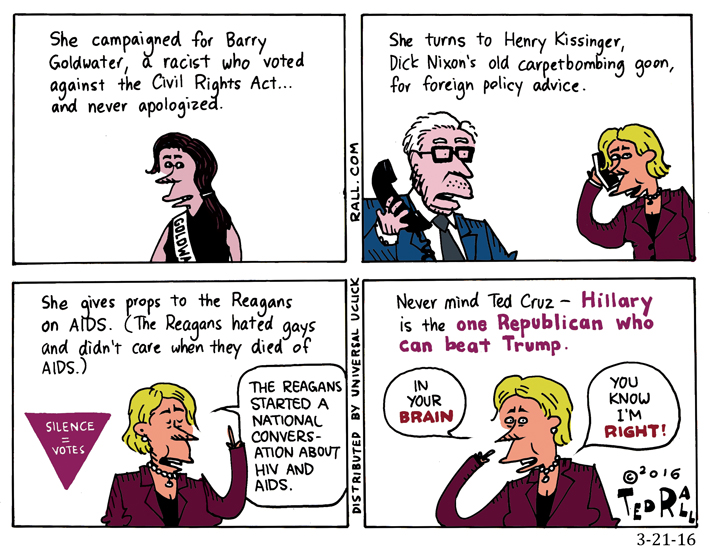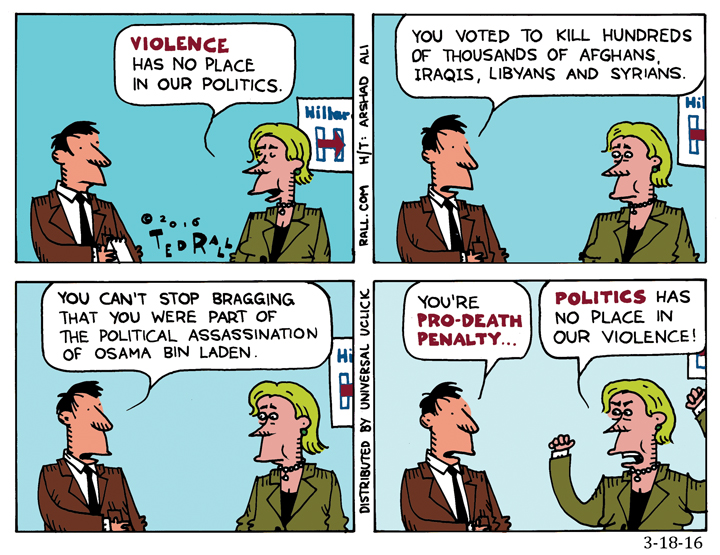After an election season in which nothing they predicted came true — their confidence that Donald Trump would never be the Republican nominee comes to mind — you’d think our losing-streak corporate pundits would be reluctant to underestimate Trump’s chance of winning the presidency in November.
Alas, there is no limit to the willfully oblivious hubris of the barking dogs of the political class. Despite last week’s cataclysm the airwaves and opinion pages are still dominated by the smug meme that It Can’t Happen Here.
Never mind that half of that It, Trump’s capture of the nomination, has Happened. But this is where Trump’s juggernaut stops, say the center-right prognosticators. Polls show him losing to Hillary Clinton by 14% — er, now it’s 2%. But still.
Trump’s disapproval ratings are as big as his ego. Women hate the guy. So do Latinos; Republicans can’t win without them. Trump, they assure, has a ceiling: 45%. No way no how will more than 45% of Americans vote for him. (Remember when the same folks told us his ceiling was 30% — of Republicans?) He’s a guaranteed loosah.
If Hillary Clinton prevails over Bernie Sanders and the Department of Justice to become the Democratic standard-bearer, she’ll be welcomed as a liberator against Trump, Democratic leaders say. Most GOP insiders say/fear the same thing: she’ll win by a landslide.
I wouldn’t be so sure.
There are plenty of good reasons to believe that Trump will defeat the former secretary of state.
Before we list them, please bear in mind something no one talks about: what an amazing candidate Trump has proven to be. Not only does Trump have no political experience, this is his first run for president, or for any elected office. For a novice to win a major party nomination on his first time out, spending hardly any of his own money, is a triumph, a trifecta without historical precedent. (True, there was Eisenhower. But Ike was the supreme commander of Allied forces during World War II, and president of Columbia University. Those were essentially political positions.) With Trump, we are in uncharted territory. The man is a beast.
Now for the factors that run counter to the widely accepted Hillary-is-a-shoo-in narrative.
First, Hillary is a weak candidate.
Her negatives are nearly as high as Trump’s. A recent poll shows her even or losing against Trump in key battleground states: Ohio, Pennsylvania and Florida. The liberal base of the Democratic Party, which mostly supports Bernie Sanders, is not at all Ready for Hillary. If the Bernie or Bust movement convinces even a few percentage points worth of Dems to stay home, write in Bernie’s name or vote for Jill Stein, that shortfall of support could be enough to throw the race The Donald’s way. If anything, Hillary is the one with a ceiling: she’s been in public life so long that it’s hard to believe that anyone who doesn’t like her now will find a reason to do so in the next six months. Politically, we’re just getting to know Trump.
Also, Americans’ hardwired historical amnesia is tailor-made for Trump.
His insane pronouncements would sink a conventional candidate. But when his racist or idiotic statements stir controversy, he doesn’t apologize: he denies that he ever said them. Then he doubles down. He constantly contradicts himself, sometimes in the same speech. This drives the media crazy. But it doesn’t touch Teflon Don. Thanks to Ronald Reagan and his ideological progeny, we’re living at a time when we choose our own facts along with our opinions — and no one is held accountable for their broken promises, hypocrisies or flip-flops. The past? Even when it isn’t past, even in real time, the past so doesn’t matter. As a conventional politician, Hillary will be forced to defend herself and her long record in public service from Trump’s attacks. Because he has no such record, and the record he does have is something he’ll just lie about — and voters will be perfectly fine with it — she can’t go after him the same way.
Because GOP campaigning is so much more effective, Democratic presidential candidates need to be at least 10% ahead of Republicans in August in order to win in November. Trump and Clinton are single digits apart, and it’s only May. Just wait until the zillions of GOP attack ads do their thing.
Trump’s Republican Party may not be as unified as they would like. But it will be unified enough to beat Hillary. Because she’s unwilling to make the policy and personnel concessions necessary to bring Sanders’ supporters into her fold — $15/hour minimum wage, offer Sanders veep — she’ll never be able to recover from the bruising primaries. Her party will be the more fractured one.
Trump is also in the unique position of being positioned to attack her from both the left and the right. He’ll go after her as a warmonger and a free trader and fiscally irresponsible and corrupt. As we’ve seen in the primaries, he has an uncanny ability to hone in on his rivals’ Achilles’ heels. Then he kicks them until they fall.
In the end, Hillary’s biggest liability may be overconfidence. She clearly doesn’t think much of Trump’s intellect, his political acumen or his campaign chops. Big mistake. This guy is many things, some of them very bad. But he is not stupid. Donald Trump is one of the most formidable politicians of our lifetimes. He can win.
(Ted Rall is the author of “Bernie,” a biography written with the cooperation of Democratic presidential candidate Bernie Sanders. His next book, the graphic biography Trump, comes out July 19th.)

 Hey Bernie supporters: Hillary has a talking point for you.
Hey Bernie supporters: Hillary has a talking point for you.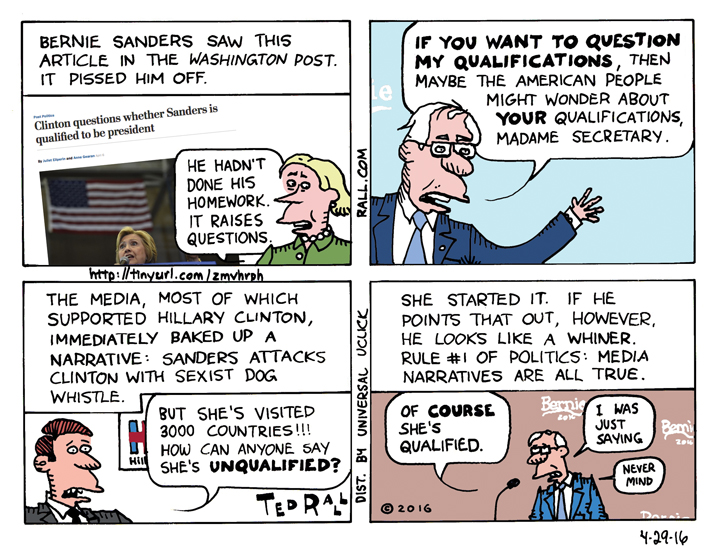
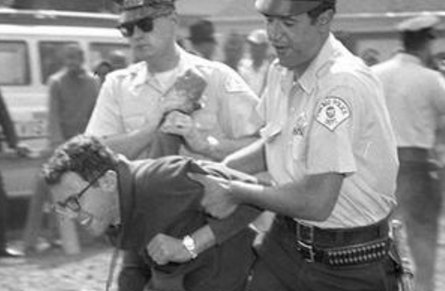
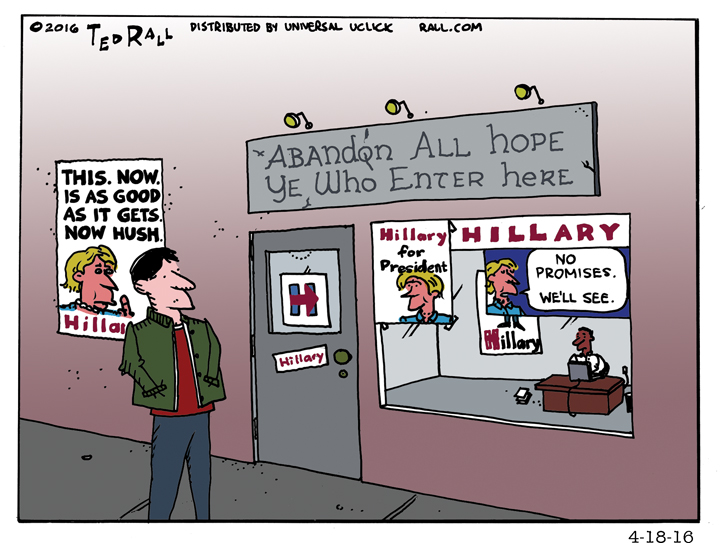
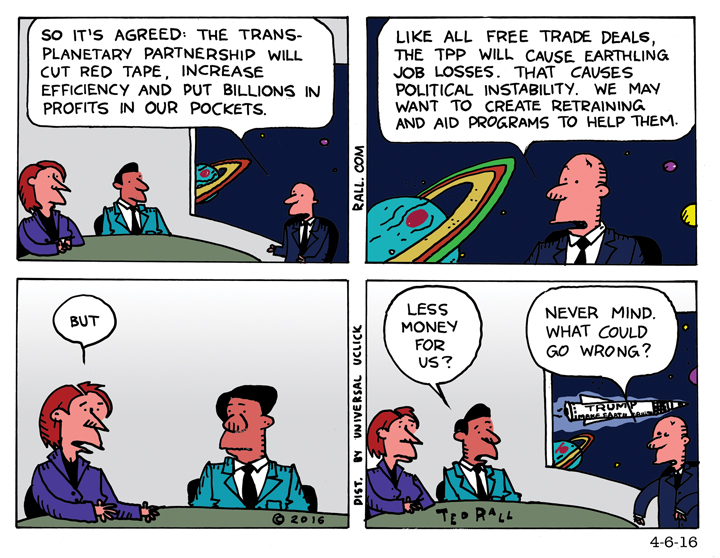
 My secret is contrarianism. Since the conventional wise men of the corporate mainstream media are
My secret is contrarianism. Since the conventional wise men of the corporate mainstream media are 